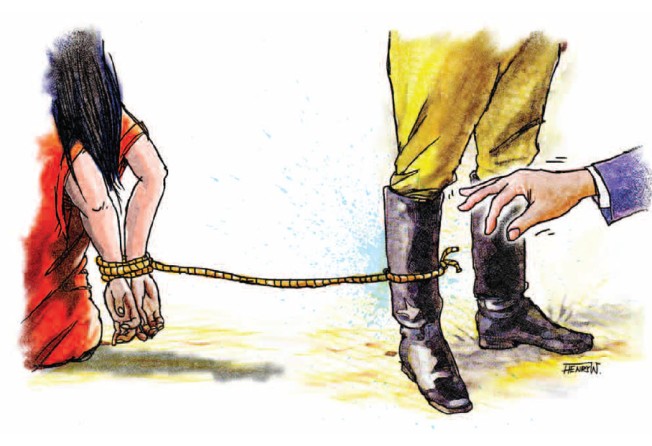Evidence of Japan's wartime role in sex slavery is incontrovertible
Danny Friedmann says Japan cannot, in this day and age, absolve its imperial army from responsibility for sex slavery during the second world war, when clear evidence of its guilt exists

During a UN Security Council session in January about "war, its lessons and the search for a permanent peace", China, South Korea and North Korea made it painfully clear that Japan's non-recognition of the "comfort women" issue, its politicians' Yasukuni shrine visits and revisionist history books form the roadblocks to reconciliation between their countries and Japan. Resolving these issues could therefore contribute to creating a less volatile atmosphere in the event of conflicts.
A stream of revisionist statements has been made by Japanese political figures, including the mayor of Osaka, Toru Hashimoto, the director general of the state broadcaster NHK, Katsuto Momii, and Chief Cabinet Secretary Yoshihide Suga.
Last May, Hashimoto said that "comfort women were needed to keep discipline in the ranks and provide rest for soldiers who risk their lives". The next week, he argued that there is an understanding among the majority of Japanese historians that there is no evidence of the involvement of the Japanese government with comfort women.
In January, Momii claimed "such women could be found in any nation that was at war, including France and Germany", and characterised the international anger as "puzzling".
Then, last month, Suga suggested that the evidence of enforced prostitution - on which a 1993 statement of apology by then chief cabinet secretary Yohei Kono was based - was unreliable or invalid.
This week, in the face of outraged protests by its neighbours, Japan said the statement would not be revised, but that it would examine how it was compiled. Suggesting the evidence is not valid has the same effect as mitigating the scope of the Kono statement.
However, this "apology" was already conditional, since it included the phrase: "the recruitment of the comfort women was conducted mainly by private recruiters who acted in response to the request of the military", thereby it does not fully acknowledge the role the Japanese imperial army played.
Reading the transcripts of the war crimes tribunal set up in Batavia (today's Jakarta), which are being studied at the Centre for Rights and Justice at the Chinese University of Hong Kong, it's clear there is sufficient evidence to show that the Japanese military was fully involved in selecting and deporting girls and young women from the camps in the former Dutch East Indies, and set up and maintained comfort stations for their enforced prostitution.
Then, when venereal diseases in the brothels increased, the Japanese military made the decision to import new girls and women. The defence in the trials that the girls and women volunteered to work as prostitutes was rendered implausible by the very coercive environment in which they had to live, or the fact they were deceived: for example, they had to sign a statement in Japanese that they were recruited voluntarily, but there was no translation.
The camps in which they were interned were plagued by severe famine and disease, and the consequences of resistance were extremely harsh: brutal reprisals by the Japanese army and military police. Therefore, one can conclude that these girls or women were incapable of giving genuine consent.
Despite this situation, there were acts of individual and collective resistance in the camps. Some girls escaped for some time, and an uprising in the camp stalled the removal of young girls.
Although the "abduction of girls and women for the purpose of enforced prostitution" was listed as a war crime by the 1919 Commission on Responsibility relating to the first world war, this crime was not incorporated in the statute of the International Military Tribunal for the Far East in Tokyo.
Even though there was ample evidence that this scourge took place in the regions and countries occupied by the Japanese imperial army, not a single person was convicted for enforced prostitution during the Tokyo trials, although the judges could have categorised enforced prostitution under a crime such as "enslavement, deportation, and other inhumane acts".
In contrast, the Batavia war crimes tribunal, conducted between 1946 and 1949, was the first time in history that people were convicted for the war crime of enforced prostitution, based on a 1946 Dutch ordinance.
After Batavia, the crime was not listed in the 1993 Yugoslavia International Criminal Tribunal statute nor in the 1994 International Criminal Tribunal statute for Rwanda, although the crime was sometimes qualified as other forms of sexual violence.
Only in 1998 did the war crime of enforced prostitution reappear in the statute of the permanent International Criminal Court in The Hague.
The Batavia documents refute any mitigation, actual or with that effect, of the apology made in the Kono statement.
Instead, the only conclusion can be that the apology is inadequate.
At least 55 "comfort women" from South Korea are still alive. They and their fellow victims from China, Taiwan, the Philippines, Singapore, Myanmar, Indonesia and the Netherlands, and their families and compatriots, are still waiting for the Japanese government to acknowledge its responsibilities. This is a necessary first step for justice and reconciliation.
As William Faulkner put it, "The past is never dead. It's not even past."
Dr Danny Friedmann is a research associate at the Centre for Rights and Justice, Chinese University of Hong Kong